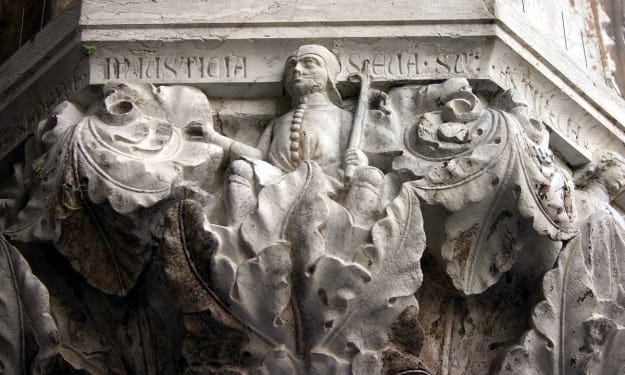The Lord High Executioner
The Story of Mob Boss Albert Anastasia

Albert Anastasia, born Umberto Anastasio on September 26, 1902, in Tropea, Calabria, Italy, was a prominent figure in organized crime during the early to mid-20th century. He became one of the most feared and influential mobsters, rising through the ranks of the Italian-American Mafia to become the boss of the Gambino crime family.
Anastasia immigrated to the United States with his family in 1919, settling in Brooklyn, New York. Like many Italian immigrants, he faced poverty and struggled to find work. In the 1920s, Anastasia became involved in illegal activities, working as a longshoreman on the Brooklyn docks and eventually becoming a member of the longshoremen's union. It was during this time that he developed ties to organized crime. Anastasia's reputation for violence and ruthlessness quickly grew. He gained the attention of Lucky Luciano, one of the most powerful mobsters of the era. Luciano saw potential in Anastasia and recognized his talent for carrying out brutal acts without hesitation. In the 1930s, Luciano appointed Anastasia as an enforcer and hitman for his crime family, which would later become the Genovese crime family. Anastasia's rise to power continued in the 1940s. He was known for his involvement in labor racketeering, extorting money from unions and controlling various industries, including the waterfront. Anastasia's ruthlessness earned him the nickname "Lord High Executioner." He was willing to eliminate anyone who posed a threat or stood in the way of his criminal enterprises.
In 1951, Anastasia took over as the boss of the Mangano crime family, which would later be renamed the Gambino crime family. He orchestrated the murder of Vincent Mangano and his brother, Philip, in a power move that solidified his position as the new boss. Anastasia was known for his authoritarian leadership style, running the family with an iron fist. He demanded absolute loyalty and severely punished anyone who disobeyed or betrayed him. Under Anastasia's leadership, the Gambino crime family expanded its operations, becoming involved in various illicit activities, including gambling, loan-sharking, narcotics trafficking, and contract killing. He was also instrumental in the establishment of the National Crime Syndicate, a network of organized crime families that cooperated to control criminal activities across the United States.
Despite his power and influence, Anastasia faced constant scrutiny from law enforcement. He was a primary target of the newly formed Federal Bureau of Narcotics, which sought to dismantle organized crime in the United States. However, Anastasia managed to evade conviction and maintain his control over the crime family for several years.
Albert Anastasia met a violent end on October 25, 1957. Anastasia was assassinated in a barber shop at the Park Sheraton Hotel, located in Midtown Manhattan, New York City. The details surrounding his death remain the subject of speculation and intrigue. On that fateful morning, Anastasia visited the barber shop located on the hotel's second floor for a haircut and a shave. As he sat in the barber's chair, two masked gunmen armed with pistols entered the shop. They swiftly approached Anastasia and opened fire, shooting him multiple times. Anastasia was killed instantly, succumbing to his injuries at the scene.
The identity of the gunmen and the motives behind Anastasia's assassination have remained unresolved. Numerous theories and rumors have circulated over the years, adding to the mystique surrounding his death. Some speculate that Anastasia's murder was ordered by rival mobsters seeking to eliminate a powerful and influential figure. Others believe it may have been an internal power struggle within the Gambino crime family or a result of disputes within the criminal underworld. The investigation into Anastasia's assassination faced significant challenges. Witnesses were reluctant to cooperate, and the evidence was scarce. Despite extensive efforts by law enforcement, no arrests were made in connection with his murder. The case remains officially unsolved.
Anastasia's death marked the end of an era for the Gambino crime family. His reign as a ruthless and feared mobster came to a violent conclusion, leaving a power vacuum within the organization. Following his death, Carlo Gambino emerged as the new boss of the family, solidifying his control and shaping the future of the Gambino crime family for years to come. Albert Anastasia's legacy as a prominent figure in organized crime endures, and his death remains one of the most notorious and intriguing unsolved cases in mob history.






Comments
There are no comments for this story
Be the first to respond and start the conversation.